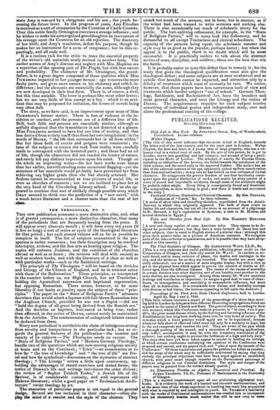THE THEOLOGIAN, NO. I.
Tins new publication possesses a more distinctive plan, and, what is of greater consequence, a more distinctive character, than many of the periodicals that are frequently issuing from the press. It will appear every alternate month ; it will form every ten years (if it live so long) a sort of series or cycle of the theological literature for that period ; but each annual volume will as far as possible be complete in itself. The list of subjects enumerated in the pro- spectus is rather numerous ; but their description may be resolved into topics, reviews, and the fine arts as bearing upon religion. The topics will embrace Judaism, and the condition of the churches abroad as well as at home ; the reviews will deal with ancient as well as modern books, and with the literature of a class as well as with particular works—such as the Rabbinical writings.
The principle of The Theologian " will be based on the Articles and Liturgy of the Church of England, and be in strictest union with those of the Reformation." These principles, as interpreted in the number before us, are High Church, but not Tractarian ; holding the Apostolical succession and baptismal regeneration, but opposing Romanism. There seems, however, to he sonic liberality if not laxity or jesuitry upon the subject of these "prin- ciples." The paper on the " State of Religious Parties " advances doctrines that would admit a layman with full-blown Romanism into the Anglican Church, provided he was not a Papist—did not "hold the dogma of all grace being derived from the Romish see." And the doctrine on baptism, insinuated as being true, rather than affirmed, in the notice of DONNE, cannot surely be maintained frcm the Articles. The condemnation of unbaptized infants cannot be deduced from them.
Every new periodical is entitled to the claim of indulgence arising from novelty and inexperience in the particular task ; but as re- gards the general features of the publication—the number and variety of its subjects — The Theologian needs no excuse. The " State of Religious Parties," and " Modern German Theology,' handle two of the questions which are now moving religious society at home and on the Continent ; " Eden"—an examination as to how far " the tree of knowledge " and " the tree of life" are lite- ral and how far symbolical—discourses on the mysteries of abstract theology ; ." The Liturgy" enters a little upon controversy, up- holding the advantages of stated exercises and stated forms; the notice of DONNE'S life and writings introduces the older divines ; the review of " Sepher Toldoth Yeshu," a Jewish life of the Saviour, is . of considerable curiosity, and well represents old Hebrew literature; whilst a good paper on " Ecclesiastical Archi- tecture" varies theology by art.
The execution of particular papers is not equal to the general design. Several are too technical in their character—often dis- play the mind of a casuist and the style of the cloister. They smack too much of the sermon, not in form, but in manner, as if the writer had been trained to write sermons and nothing else. There is also occasionally too much of scholastic nicety for the public. The hair-splitting refinement, for example, in the " State of Religious Parties," will to many look like dishonesty, and be distasteful to all except Tractarians and clerical schoolmen. The capacity of the persons being equal, the scholastic manner and style may be as good as the popular, perhaps better; but when the appeal is to the public, there is no doubt which will be most successful. It is practically useless to talk about the abstract merits of arms, discipline, and soldiers ; those are the best that win the battle.
It is probably easier to note this defect than to remedy it ; for the study that gives the theological qualification must also give the theological defect ; and some subjects are at once so abstract and so subtile that breadth cannot be imparted, and attraction only by a felicity of treatment which must of necessity be rare. We notice, however, that those papers have less narrowness both of view and treatment which involve subjects "out of school." German Theo- logy, Rabbinism, and Ecclesiastical Art, have the broadest and most general character, and next the Liturgy and the notice of DONNE. The acquirements requisite for each subject involve something of individual genius and independent study, over and above the professional training of the college.


























 Previous page
Previous page